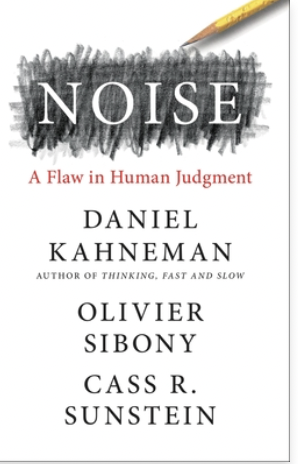
Thinking, Fast and Slow Daniel Kahneman’s last masterpiece book, has demonstrated in a companion volume book Noise, aimed at most people care about rationality and good judgement. Multi-million copy bestselling author Daniel Kaneman teamed up with co-author of million copy bestseller Nudge, Cast Sunstein and the eminent professor and writer on strategic thinking Olivier Sibon, brings out Noise, revealing an insight into the world of decision making and how to successfully separate the distracting hubbub of others from the core action at hand which is exceedingly important to practice. Noise contributes significantly to errors in all fields, including medicine, law, economic forecasting, police behaviour, food safety, bail, security checks at airports, strategy and personal selection. The authors draw on latest findings in psychology and behavioural economics and the same kind of diligent, insightful research explaining how and why humans are so susceptible to noise in judgement and what can we do about it. Noise is about how judgements are predictably inconsistent – scattered apparently randomly around the target, rather than veering off in a particular direction. “The wisdom of crowds”, where a large group’s average guess turned out to be remarkably accurate. But in most context judgement the err in different directions do not cancel out although if one convict gets excessive sentence, and another get away easily, justice has not been done in aggregate. But apparently, it has been violated twice. An insurance company that pays out too much to one claimant and much too little to another has lost money in one case and likely to lose customer in the other. The authors demonstrates that noise does at least as much harm as bias and it is not irreducibly random as its various causes can be isolated and resisted. Bias comes in large number of different forms from loss eversion to overconfidence to confirmation bias. Bias is simply sexier than noise, Noise come from a very human failure to think in disciplined, statistical way. Eliminating noise from judgements is less a matter of enlightenment than grinding out there right procedures called “decision hygiene”.
Think about each case not as unique but as a representative of a larger, statistically regular class, ready to renounce your gut instincts, break down complex judgements into smaller ones, let members of a group come to truly independent conclusions before aggregating them.
There should be commitment to humbleness about out ability to make nuanced judgments accurately, as people sadly are not good at that and substation of simple, clear rules for individual discretion almost always render better results.
We are committed to the notion that in judgements of man sorts- legal rulings, college admissions, job applications, performance reviews – each individual deserves a unique hearing, acknowledging their particularity.
We also want to shift our decision criteria on the fly as the world and our values change. Giving individual decision makers room to tailor their judgements in response to seemingly crucial details of case almost always makes decisions the aggregate less accurate, less fair and more costly.
You can be more sensitive or less wrong, but Noise suggests tact there is an analogous and equally important trade-off in judgement between allowing flexibility and creativity and limiting random errors with a balance we all have to strike.
Noise: A Flaw in Human Judgement by Daniel Kahneman, Olivier Sibony and Csts R Sunstein, William Collins £25/ Little Brown Spark $32, 463 pages.
